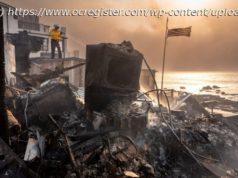Protests have been gathering steam in a remote region, leading to some government concessions but most recently resulting in a deadly clash with armed forces.
EL KAMOUR, Tunisia — It may look like just a clutch of tents pitched outside an oil pumping station on the edge of the Sahara. But to the people of this southern region, this is Tunisia ’s second revolution.
Tired of waiting for the government to relieve their poverty and create jobs, thousands of young people have been camping here and demonstrating in the main town, Tataouine, for weeks.
This past week, the protesters shut the main oil pipeline at El Kamour and clashed with units of the National Guard who tried to burn down the camp on Monday. A police station and a National Guard post were burned in turn. One protester was killed, and at least two others were gravely wounded.
Six years after the revolution that brought down Tunisia’s dictator of 23 years, Zine el-Abidine Ben Ali, the protests reflect mounting frustration at the broken promises of the country’s new democratic leaders to bring tangible improvement to poorer regions like this one.
Yet the protesters are themselves a sign of change in the country, as are the challenges confronting the government. The demonstrators are representative of a new generation that has come of age in relative freedom, only to face the prospect of long-term unemployment.
A large number are university graduates, organized and articulate. All out of work, they have forged a united movement out of protesters from a swath of towns and villages across the area.
There was no particular spark that started the protests, the first of which began in Ksar Ouled Debbeb, a small town just outside Tataouine, on March 14. The protesters’ core demand is simply more jobs.
“We were fed up, ” Ali Ghaffari, 24, an English student, said. “We were young people in our 20s. We made a list of 260 people who are jobless.”
Other protests soon followed in surrounding towns. In April, protesters began camping in front of the governor’s office, and a month ago they set up the camp in the desert.
The government recently handed out new oil concessions in the region, a step that only served as a reminder of how little the region benefits from the resource. The oil companies hire people generally from outside, and little is invested back.
The protesters’ demands have steadily solidified: a quota of jobs for local people at the oil companies drilling in the region, the creation of jobs in an environmental agency and an investment fund for job creation programs.
The government has denounced the leaders of the unrest as having links to terrorists or being the tools of mafia bosses. But it has steadily raised its response to their demands.
The protesters are holding out for more, and an uneasy truce has descended after thousands turned out to bury the man who was killed — Muhammad Anouar Sakrafi, who was 23 and unemployed.
In the desert camp, about 125 miles south of Tataouine, 200 protesters were keeping watch Thursday, and the pipeline remained shut.
Resting up in the shade of their tents from the harsh Saharan sun, they said they would remain until the government accepted 17 demands they hadput forward.
“Everyone came for our rights and for jobs, ” one of the protesters, Walid Abdelmollah, 27, said. “We are here to the end. No going back!” he added, using a phrase that has become the signature chant.
In Tataouine, the protesters control life on the streets. They are camped outside the governor’s office and at main intersections, in scenes reminiscent of the popular uprising of 2010 and 2011. Remnants of burned tires still block parts of the roads.
The governor resigned Tuesday and left town, and the police and army were absent from view. A handful of police officers in civilian clothes emerged from the charred shell of the main police station to talk to reporters. The situation was still uneasy, they said, and they were not wearing uniforms, in order to keep a low profile.
“This is the second revolution, ” said Ahmed Wafi, a retired civil servant whose daughter, Sabrine Wafi, is a leading women’s activist in the town. “And this one is more serious.”
The protesters have organized themselves almost entirely on Facebook and have been sharing and live-streaming events on their social media accounts. They have largely bypassed the mainstream Tunisian media and remain distrustful of journalists.
“There is a problem of confidence in the mainstream media, so everyone goes on social media, ” said Youssef Zorgui, who has been running a Facebook page in his hometown, Bir Lahmar, and covered the protests in the camp. “We can share everything on Facebook, whereas the media have censors or show only one or two minutes of the events.”
The protesters have pointedly chosen not to elect leaders of the movement. “It is a democratic movement. We decide altogether, ” as one said. He asked that only his first name, Naim, be used.
The movement has rejected any involvement of political parties — in the camp, the protesters are not allowed to discuss politics — and they have kept civil society groups and much of the Tunisian news media, whom they accuse of bias, at arms’ length, banning them from the desert camp.
The government has made efforts to respond to their demands — if unevenly. The prime minister, Youssef Chahed, traveled to the region to talk to the protesters in April and has sent his employment minister for negotiations.
It is not clear who ordered the National Guard to intervene forcibly on Monday. The governor had insisted publicly that there would be no use of force only minutes before the National Guard moved on the camp. Aides suggested that his resignation was due, in part, to his having been undermined.
In addition to jobs and investment, the protesters are now demanding an apology for the police violence; they accuse the National Guard of deliberately running down protesters in the camp.
Witnesses said Mr. Sakrafi had been knocked down from behind by a racing police vehicle. He suffered multiple fractures to his legs, head and torso and died on the spot, his cousin Mustafa Sakrafi said. Protesters said they had handed videos of the event to the military investigator the next day.
It remains unclear who set fire to the police station and the National Guard post in Tataouine.
Home
United States
USA — Political Young and Unemployed, Tunisians Agitate for a ‘Second Revolution’






